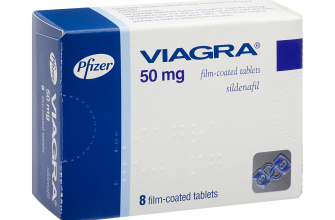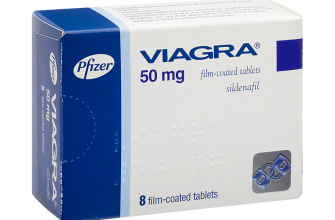Consult your healthcare provider for a prescription if you are experiencing difficulties with erectile function. Viagra, a widely used medication, is designed to improve blood flow, resulting in effective erections when sexual stimulation occurs. This medication can be an essential part of a tailored treatment plan, and your doctor can determine if it’s suitable for you.
Many individuals benefit from understanding the specific dosage and timing for taking Viagra. Typically, it’s recommended to consume the tablet approximately 30 minutes to 1 hour before engaging in sexual activity. Depending on your health status and the nature of your condition, your doctor will suggest the appropriate dosage, usually ranging from 25 mg to 100 mg.
Potential side effects exist, and discussing these with your physician is crucial. Common reactions include headaches, flushing, and nasal congestion. In rare cases, more severe side effects might occur. Always report any unusual symptoms to your doctor promptly. This transparency helps ensure your treatment remains safe and effective.
- Prescription of Viagra: A Comprehensive Overview
- Understanding Viagra: Indications and Uses
- The Importance of a Prescription for Viagra
- Health Assessment
- Avoiding Risks
- How to Obtain a Viagra Prescription: Step-by-Step Guide
- Schedule an Appointment
- Follow the Recommendations
- Common Misconceptions About Viagra Prescriptions
- Potential Risks and Side Effects of Viagra
- Common Side Effects
- Serious Risks
- Alternatives to Viagra: Prescription Options
- Insurance Coverage and Viagra Prescription Costs
- Types of Insurance Plans
- Cost Factors
- Maintaining Communication with Your Healthcare Provider
- Be Honest About Your Concerns
- Ask Questions
Prescription of Viagra: A Comprehensive Overview
Consult a healthcare provider before using Viagra to ensure it is suitable for you. A professional will assess your medical history, current medications, and any underlying conditions. This evaluation helps identify potential risks or contraindications.
Typically, Viagra is prescribed for erectile dysfunction. The standard starting dose is 50 mg taken about one hour before sexual activity. Depending on individual response and tolerability, your doctor may adjust the dose to a maximum of 100 mg or reduce it to 25 mg if needed.
Take Viagra as needed, not more than once a day. It is advisable to avoid high-fat meals before taking the medication, as fatty foods can delay its onset of action. Generally, the effects last up to four hours, allowing sufficient time for sexual activity.
Be aware of possible side effects, which include headaches, flushing, and digestive issues. In rare cases, more severe reactions may occur, such as sudden vision or hearing loss. Report any unusual symptoms to your doctor immediately.
Discuss any other medications you are taking, as certain drugs can interact negatively with Viagra. This includes nitrates used for chest pain, as the combination can lead to a severe drop in blood pressure.
Regular follow-up appointments with your healthcare provider will help monitor your response to treatment. Keeping an open dialogue about your experience with Viagra can guide further management and adjustments to your prescription.
Understanding Viagra: Indications and Uses
Viagra, or sildenafil citrate, primarily treats erectile dysfunction (ED) in men. It enhances blood flow to the penis, aiding in achieving and maintaining an erection when sexual stimulation occurs. This medication is effective for various causes of ED, ranging from physical conditions like diabetes and hypertension to psychological issues such as anxiety and depression.
Another approved use of Viagra is the treatment of pulmonary arterial hypertension (PAH). By relaxing blood vessels in the lungs, it improves exercise capacity and reduces symptoms associated with this condition. Patients with PAH typically experience improved blood flow and reduced strain on the heart.
It is essential to follow a healthcare provider’s instructions regarding the use of Viagra. The usual recommended dose for ED is 50 mg taken approximately one hour before sexual activity, but adjustments may occur based on efficacy and tolerability. For PAH, dosages can vary based on individual health needs. Always consult your doctor for personalized recommendations.
| Condition | Recommended Use | Notes |
|---|---|---|
| Erectile Dysfunction | 50 mg, as needed | Take one hour before sexual activity |
| Pulmonary Arterial Hypertension | Varies by individual | Follow healthcare provider guidance |
Potential side effects include headaches, flushing, and indigestion. Serious side effects, like sudden vision loss or an erection lasting more than four hours, require immediate medical attention. Combining Viagra with certain medications, particularly those containing nitrates, can lead to dangerous blood pressure drops. Discuss your complete medical history with your doctor to avoid contraindications.
Viagra plays a significant role in enhancing sexual health and managing PAH. Always engage with your healthcare provider to ensure safe use tailored to your specific conditions.
The Importance of a Prescription for Viagra
Obtaining a prescription for Viagra is critical for safety and efficacy. A qualified healthcare provider assesses your health history, identifies potential drug interactions, and determines the appropriate dosage tailored to your needs.
Health Assessment
A thorough health evaluation helps ensure that Viagra is suitable for you. Conditions such as heart disease, hypertension, and diabetes significantly influence the choice of treatment. Consulting a physician guarantees that any underlying issues are appropriately addressed before starting the medication.
Avoiding Risks
Without a prescription, you risk adverse effects. Viagra may cause side effects ranging from headaches to more severe complications like priapism. A healthcare professional provides guidance on possible reactions and how to manage them, ensuring a safer experience. Regular follow-ups allow for adjustments and monitoring, enhancing overall wellbeing.
Consult your doctor to begin your journey safely. A prescription not only empowers you with valuable knowledge but also paves the way for effective management of erectile dysfunction.
How to Obtain a Viagra Prescription: Step-by-Step Guide
Consult a healthcare professional to discuss your symptoms and medical history. Be honest about any issues you are facing, such as erectile dysfunction. This conversation is crucial for determining if Viagra is appropriate for you.
Schedule an Appointment
Book an appointment with a doctor or a licensed healthcare provider. Many clinics offer telehealth options, allowing you to consult from the comfort of your home. Prepare for the consultation by listing your questions and concerns to ensure all relevant points are covered.
Follow the Recommendations
After the consultation, your provider may conduct a physical examination or recommend tests to rule out underlying conditions. If Viagra is deemed suitable, you will receive a prescription. After obtaining the prescription, fill it at a pharmacy or an online pharmacy that is licensed. Always follow the instructions provided with the medication and reach out to your provider if you have any questions about dosage.
Common Misconceptions About Viagra Prescriptions
Many believe that obtaining a Viagra prescription requires a lengthy and complicated process. In reality, medical professionals can often provide a prescription after a straightforward consultation. This involves discussing symptoms, medical history, and any medications currently being taken.
Another common misconception is that Viagra is solely for older men. While it is frequently prescribed to older patients, issues with erectile function can affect younger men as well. Identifying the root cause of these issues is essential for effective treatment.
Some individuals think that Viagra functions like an aphrodisiac. Viagra does not increase sexual desire; it facilitates blood flow, making it easier to achieve and maintain an erection. Open communication with a healthcare provider about expectations is vital.
Another point of confusion involves the perception of Viagra as a one-size-fits-all solution. Dosages vary based on individual needs and medical conditions. A healthcare provider will tailor the prescription based on a thorough assessment.
People sometimes assume that purchasing Viagra online is safe, but this is not always true. Many websites sell counterfeit medications. Always consult a licensed healthcare professional before making a purchase and ensure it’s from a reputable source.
Some may believe that taking Viagra will lead to automatic results without any stimulation. This is misleading; sexual arousal is still necessary for the medication to work effectively. Understanding how Viagra works allows users to have realistic expectations.
Lastly, there’s a myth that Viagra is habit-forming. Clinical evidence does not support this; while some may feel reliant on the medication, it does not create physical dependence. Frequent discussions with a healthcare provider can help manage any concerns related to usage.
Potential Risks and Side Effects of Viagra
Viagra can cause various side effects that users should be aware of. Prioritize your health by discussing any concerns with a healthcare professional before starting the medication.
Common Side Effects
- Headache
- Flushing (face and neck redness)
- Dyspepsia (indigestion)
- Nasal congestion
- Dizziness
Serious Risks
While rare, some individuals may experience severe reactions:
- Priapism (a prolonged and painful erection lasting more than four hours)
- Sudden vision loss in one or both eyes
- Sudden hearing loss or ringing in the ears
- Cardiovascular issues, including heart attack or stroke, especially in those with pre-existing heart conditions
Individuals with heart problems, low blood pressure, or those taking nitrates should exercise caution. Always keep your doctor informed about your medical history and current medications to minimize risks. Regular check-ups can help monitor any side effects.
Alternatives to Viagra: Prescription Options
Cialis (tadalafil) offers a long duration of action, lasting up to 36 hours. This flexibility allows for spontaneous intimacy without needing to time your dose precisely. Consult your doctor about proper dosing tailored to your needs.
Levitra (vardenafil) works similarly to Viagra but may cause fewer side effects for some users. It typically lasts up to 5 hours. Ensure you discuss with your healthcare provider whether it suits you better.
Stendra (avanafil) has a rapid onset, effective within 15 minutes for many men. This option may be ideal for those seeking a quick solution. Discuss your suitability with a medical professional.
Injection therapies, such as alprostadil, can deliver quick results. Administered directly into the penis, they often lead to erections within minutes. Explore this option if oral medications haven’t met your expectations.
Hormonal treatments, particularly testosterone replacement therapy, can benefit men dealing with hormonal imbalances. If low testosterone levels contribute to erectile dysfunction, check if this treatment aligns with your health goals.
Insurance Coverage and Viagra Prescription Costs
Check your insurance policy details to understand the coverage for Viagra prescriptions. Many insurance plans offer partial or full coverage, but specific conditions must be met.
Types of Insurance Plans
- Private Insurance: Often covers Viagra under certain conditions such as medical necessity.
- Medicare: Typically does not cover Viagra, but exceptions may exist for related medical conditions.
- Medicaid: Some states may include Viagra coverage, especially if prescribed for specific health issues.
Cost Factors
Prescription costs for Viagra can vary based on several factors:
- Quantity: Bulk prescriptions often reduce the individual pill cost.
- Local Pharmacy Prices: Prices can differ widely; compare pharmacies for the best rate.
- Generic Options: Consider using the generic version, Sildenafil, which is typically cheaper.
Talk to your healthcare provider about obtaining necessary documentation if your insurance requires it. This step can help reduce out-of-pocket costs. Always verify before filling your prescription to avoid unexpected expenses.
Maintaining Communication with Your Healthcare Provider
Schedule regular check-ins with your healthcare provider to discuss your experience with Viagra. Update them on any side effects or changes in your condition. This keeps your treatment tailored to your needs and can facilitate adjustments if necessary.
Be Honest About Your Concerns
If you experience side effects, no matter how minor they may seem, communicate these details. Your provider can offer solutions or alternative options that may better suit you. Open dialogue helps build trust and ensures that you are getting the most from your treatment plan.
Ask Questions
Don’t hesitate to ask for clarification on your prescription or treatment. If you’re unsure about dosage or timing, seek guidance. Engaging directly with your healthcare provider empowers you to make informed decisions about your health.






